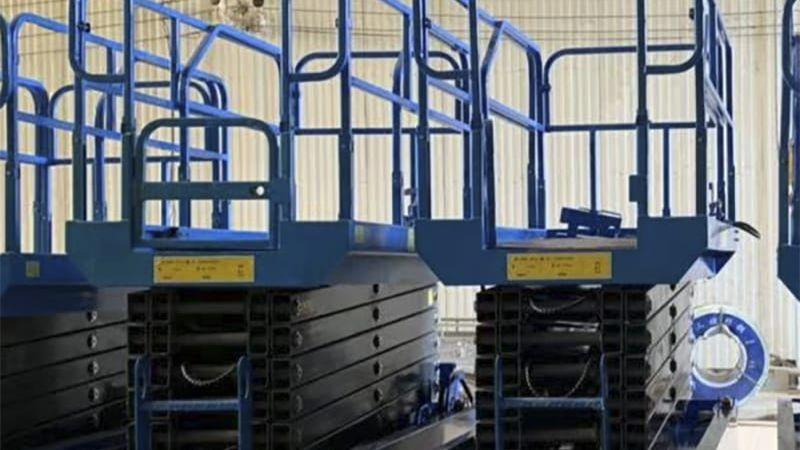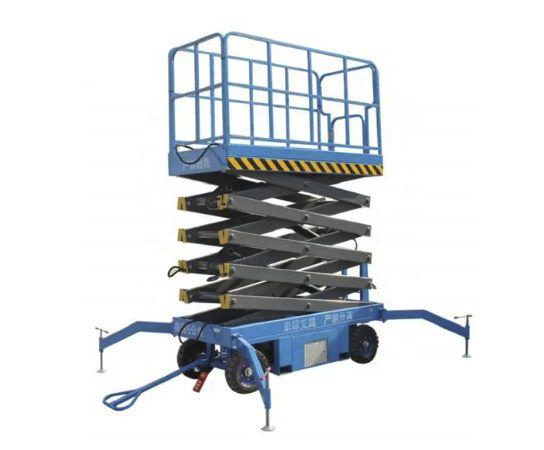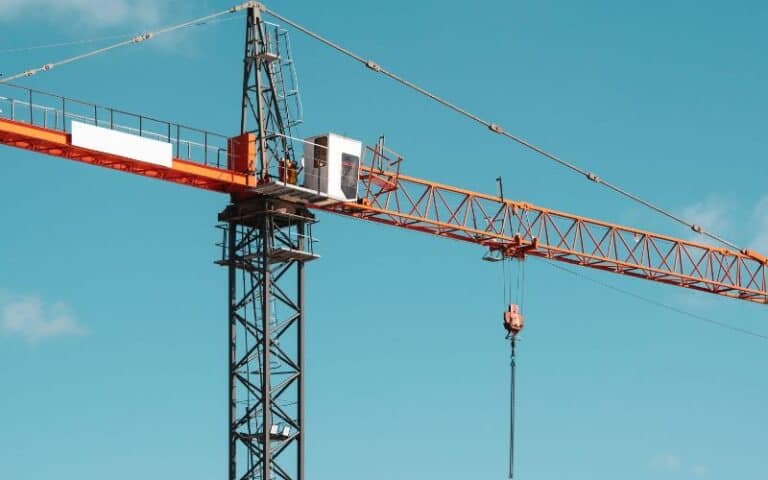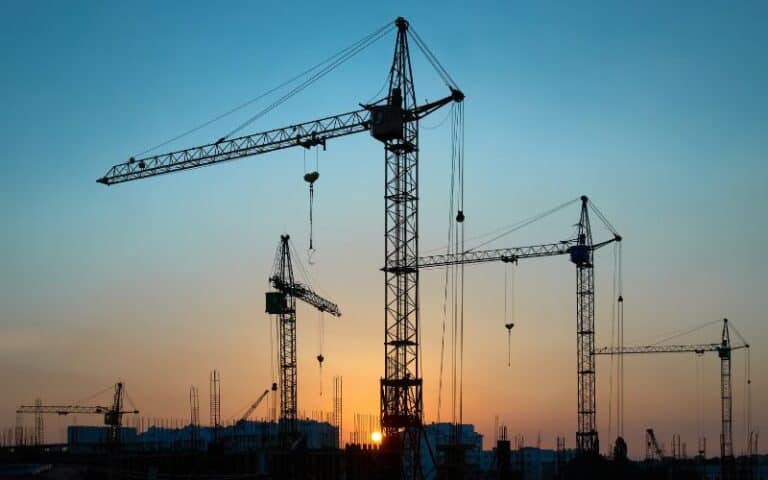What are the Different Types of Scissor Lifts
Scissor lifts vary in model and size, designed specifically for indoor or outdoor tasks. Your choice depends on the nature of the work environment and the tasks at hand.
Indoor Electric Scissor Lifts
Indoor electric scissor lifts are designed primarily for operations within industrial or commercial buildings. These lifts are typically more compact to navigate through tight spaces:
- Ihurmo 14m scissor lift: A small model, ideal for maneuvering in limited spaces with the highest weight of 300kg.
- Ihurmo 19 foot scissor lift: High-performance aerial work platform that combines safety, reliability, and versatility, rate load of 500 kg, which can be used both indoors and outdoors.
These electric scissor lifts run quietly, making them perfect for noise-sensitive environments.
Outdoor Rough Terrain Scissor Lifts
For more robust needs, outdoor rough terrain scissor lifts come equipped to handle uneven surfaces and heavier loads:
- Characteristics:
- Often have a diesel or gas engine
- Equipped with heavy-duty tires for stability
- Hydraulic scissor lift mechanisms to navigate rough terrain
- Models by Weight:
- Ihurmo self-propelled hydraulic scissor lift: Ihurmo’s popular product which utilizes hydraulic cylinders to extend the scissor mechanism, with a rated limit load of up to 500kg.
What Affecting the Load Capacity of a Scissor Lift

When you’re selecting a scissor lift for your project, weight plays a crucial role, both in terms of logistics and safety.
Your scissor lift’s scissor lift weight is determined by several factors:
- Lift Platform Size: The bigger your platform, the more space you have for workers and materials, which translates into a higher potential load capacity.
- Scissor Mechanism Design: The materials used, the arrangement of the crossbars, and the design’s general strength are essential for maxing out your lift’s load-bearing potential. The right combination of materials and design leads to a longer-lasting, more reliable lift.
- Hydraulic System: The heart of your scissor lift’s vertical prowess lies in its hydraulic system. This system’s performance is integral to how much weight your lift can manage. Keeping it well-maintained ensures consistent and strong lifting capabilities.
- Power Source: Electric, diesel, or hydraulic power? Each will impact the load capacity differently. Generally, electric-powered lifts may handle lighter loads, so match the power source to the demands of your task for the best load handling.
- Operating Environment: The terrain and conditions where you operate your scissor lift play a part, too. For instance, slopes or uneven grounds can affect load capacities. Always stick to the manufacturer’s conditions for safe operation.
- Operating Weight: The operating weight of a scissor lift includes the weight of the machine itself, along with any batteries and accessories it might have. Generally speaking, operating weight affects load capacity.
Here is a table of common-sized scissor lift operating weights:
| Indoor Scissor Lift Size (feet) | Standard Minimum Weight |
| 19’ Scissor Lift | about 2,700 lbs |
| 26’ Scissor Lift | about 4,000 lbs |
| 32’ Scissor Lift | about 5,400 lbs |
| 40’ Scissor Lift | about 6,000 lbs |
| Outdoor Scissor Lift Size (feet) | Standard Minimum Weight |
| 19’ Scissor Lift | about 6,300 lbs |
| 26’ Scissor Lift | about 7,300 lbs |
| 32’ Scissor Lift | about 5,900 lbs |
| 40’ Scissor Lift | about 15,000 lbs |
How to Choose a Suitable Scissor Lift?

Advantages of Using a Lightweight Scissor Lift
Lightweight aluminum scissor lifts have some key benefits over heavier steel models:
- Easier to transport and maneuver on job sites
- Lower costs for shipping/delivery
- Can use more units on projects with floor load limits
- Suitable for indoor use without damaging floors
- Quiet operation with electric power
Advantages of Using a Heavy-Duty Scissor Lift
While heavier, rough terrain and self-propelled scissor lifts offer advantages for certain applications:
- Higher load capacities for heavy materials/equipment
- Greater lift heights for elevated work
- Ability to work on uneven outdoor terrain
- Some have extended outriggers for extra stability
What is the Load Capacities of Ihurmo Scissor Lifts
How much does a scissor lift weigh? In Ihurmo, we have different models for you to choose from. Here are the parameters of some common models:
Single-Mast Aluminum Scissor Lifts:
- SJL0.1-4(1) – 4m platform height, 100kg rated load
- SJL0.1-6(1) – 6m platform height, 100kg rated load
- SJL0.1-8(1) – 8m platform height, 100kg rated load
- SJL0.1-9(1) – 9m platform height, 100kg rated load
- SJL0.1-10(1) – 10m platform height, 100kg rated load
Double-Mast Aluminum Scissor Lifts:
- SJL0.2-4(2) – 4m platform height, 200kg rated load
- SJL0.2-6(2) – 6m platform height, 200kg rated load
- SJL0.2-8(2) – 8m platform height, 200kg rated load
- SJL0.2-10(2) – 10m platform height, 200kg rated load
- SJL0.2-12(2) – 12m platform height, 200kg rated load
- SJL0.2-14(2) – 14m platform height, 200kg rated load
Self-Propelled Scissor Lifts:
- SJY0.5-4 – 4m platform height,500kg rated load
- SJY0.3-14 – 14m platform height, 300kg rated load
At Ihurmo, we understand that every workplace has its unique requirements when it comes to accessing elevated areas safely and efficiently. That’s why our scissor lift product line is designed with flexibility and customization in mind.
Whether you need a lightweight aluminum lift for indoor maintenance tasks or a heavy-duty steel model capable of handling immense loads outdoors, we can develop the perfect solution tailored to your specific needs.
Frequently Asked Questions:
Can a scissor lift go through a door?
Whether a scissor lift can go through a door depends on the width or working height of the lift and the door. Normally, a standard indoor scissor lift can fit through most commercial doors.
Do I need a harness when I am using a scissor lift?
Most scissor lifts do not require a harness as they are equipped with guardrails. However, always check the manufacturer’s guidelines and local safety regulations to ensure you’re in compliance.






